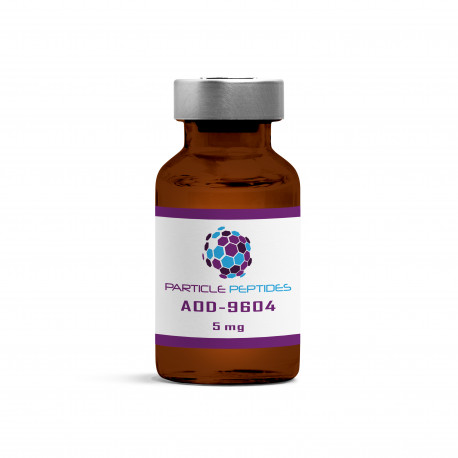-
 Weight Loss Research
Weight Loss Research

 Weight Loss Research
Weight Loss Research

AOD-9604, lipolytic peptide fragment, which was derived from human growth hormone (HGH) during the late 1990s was modified from HGH residues 176-191. This modified compound primarily works as an element for fat burning and obesity treatment, while the exact mechanism by which this happens is still under research. It stimulates the breakdown (metabolism) of fat stores and inhibits the formation of fats without any detected side effects, affecting blood sugar levels or causing abnormal growth. In addition, the peptide shows several, apparently independent, positive effects on cartilage regeneration, improvement of metabolism or heart activity, confirmed by research.
A synthetically produced peptide AOD-9604 consists of 15 amino acids. It is derived fragment of human growth hormone (fragment 176-191) known mainly for its lipolytic qualities, thanks to which it can perfectly stimulate body fat burning without negative side effects, that are mainly perceived by using common weight loss drugs. Study has shown that it has a very good tolerability and safety, thus the immune system does not form any antibodies against the AOD-9604 peptide. Other great benefit seems to be that blood sugar levels are not affected. However, several studies have also shown that chronic treatment with AOD-9604 had no adverse effect on insulin sensitivity of researched animals. So, the peptide does not appear to affect IGF-1 or insulin levels at all.
Now we would like to bring you closer to the effects of the peptide, which have been researched and confirmed in studies.
[1] [2]
AOD-9604 as a lipolytic fragment of HGH was developed and thereafter studied most of all for its effective fat burning functions and as a potential anti-obesity drug. Demonstration of these qualities was realized by several clinical studies both in animals and humans. Obese rats, which were treated by AOD-9604 for 19 days reduced their body weight over 50% and the lipolytic activity of their adipose tissues increased.
Another research in mice was studying treatment effects of human GH and AOD-9604 in weight loss for 14 days. One mechanism which could lead to these properties was suggested to be the binding of beta-3-adrenergic receptors located on white fat and thus increasing the rate of metabolism in fat cells. Even the peptide can increase the expression of the major lipolytic fat cells receptor this probably has only some secondary function in fat loosing. Study showed that even mice lacking these receptors showed fat loss after administration of AOD-9604.
Most obesity drugs may suppress appetite or food absorption, but only few actually stimulate fat metabolism like the peptide AOD-9604, which has also been tested as an obesity drug in humans. Clinical trials testing the drug on 300 obese patients in Australia once a day for 12 weeks tripled the weight loss compared to a placebo. It was also shown that the rate of weight loss remained stable during the trial period. The patients used six different doses– 0 mg (placebo), 1mg, 5 mg, 10 mg, 20 mg and 30 mg. Finally the weight lost by the group of 1mg dose was slightly more than that achieved by the world’s largest selling prescription obesity medication in similar trials over the same period, without its troublesome side effects.
[3], [4]
Another benefit which could be potentially used out of AOD-9604 and was researched is the matter of joint function and pain relief. The research study carried out this time in rats assumed the application of AOD-9604 injections directly into the arthritic joints of the animals. The conclusion was that injections using ultrasound guidance inhanced cartilage regeneration, and combined AOD-9604 plus hyauloronic acid (HA) injections were much more effective. The effectiveness of AOD-9604 in treating the underlying cause of osteoarthritis was demonstrated by changes in the gross clinical examination as well as changes in the microscopic structure of the cartilage in the affected joints. AOD-9604 can thus be effective not only as a treatment, but also as a prevention. And while it works well on its own, it seems to work better when combined with other beneficial compound as HA. Further research on the peptide may thus reveal new pathways to improve cartilage growth and regeneration.
[5]
Reducing body fat and weight is directly related to reducing the risk of heart disease. Therefore AOD-9604 can have beneficial effects on heart function in addition to its fat-burning effects. Some evidence suggests that AOD-9604 has beneficial effects on the heart even beyond its ability to reduce fat burden. It is believed that this peptide may directly affect metabolism and reduce complications independent of its effects on obesity.
[6]